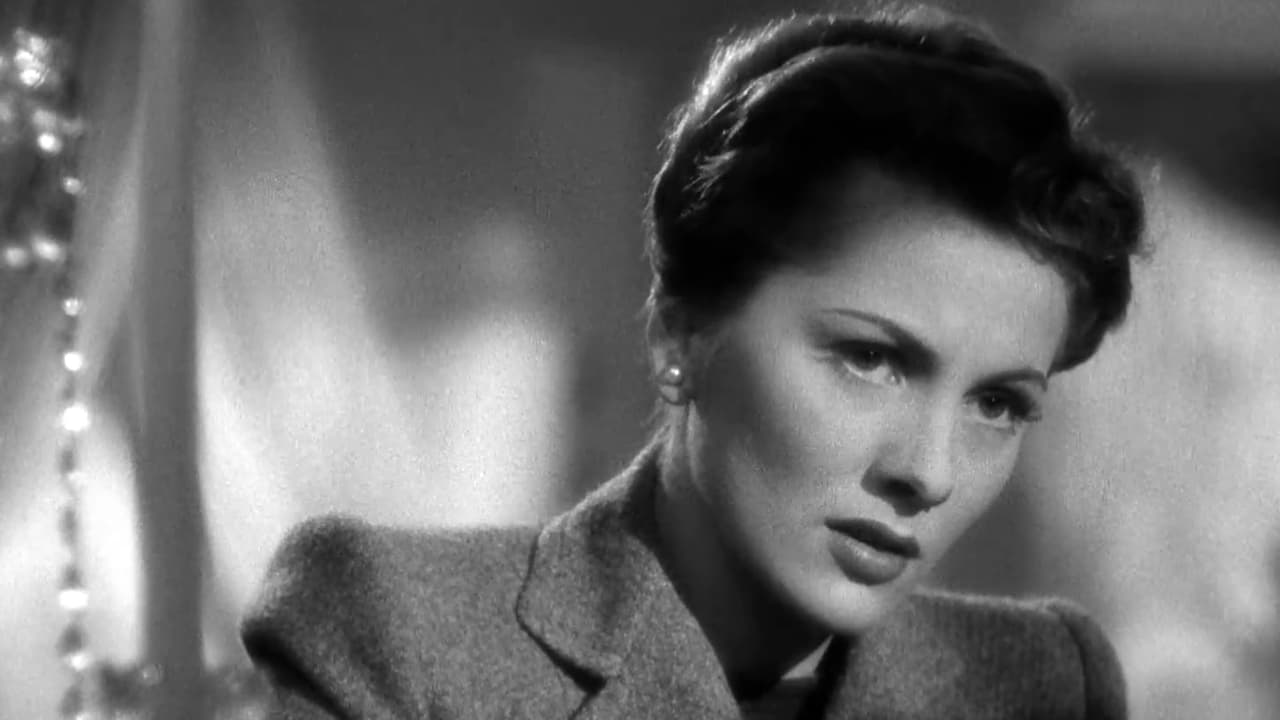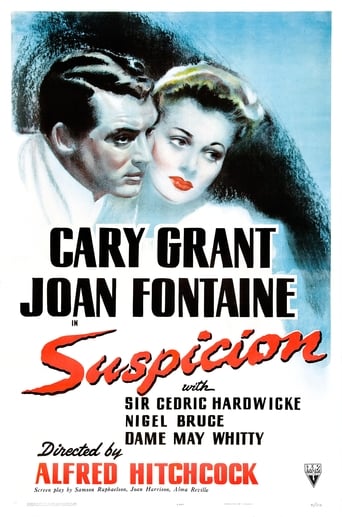



Better Late Then Never
It’s fine. It's literally the definition of a fine movie. You’ve seen it before, you know every beat and outcome before the characters even do. Only question is how much escapism you’re looking for.
View MoreA film of deceptively outspoken contemporary relevance, this is cinema at its most alert, alarming and alive.
View MoreThe movie really just wants to entertain people.
Lina McLaidlaw, dowdy and seemingly headed for spinsterhood, although played by the beautiful Joan Fontaine, gets teased and oddly pursued by charming Johnnie Aysgarth. He calls her monkey-face, yet is attracted to her. She feels a reciprocal attraction. Their attraction grows, and they elope one night because Lina knows her father does not approve of Johnnie.The two go on a European honeymoon with Johnnie pulling out all of the stops and come home to a large household with servants. It is then, after the honeymoon that Lina discovers Johnnie has no money of his own. He simply borrows from all of his friends in a round robin fashion and even has designs on borrowing from her father! Since Lina's small allowance will never pay for all of this she insists that Johnnie go to work. He does so, getting a job from his cousin Captain Melbeck helping him manage his estates. But then things start to happen - Lina finds out that Johnnie has pawned the two chairs her parents gave her as a wedding present, and worst of all she finds out from Captain Melbeck that Johnnie was dismissed six weeks before when he was found to have embezzled two thousand pounds, although he will not prosecute if he returns the money. All of this time he has pretended to go to work every morning.So she is definitely married to a liar and a thief who is lazy about everything but in covering up his sins to Lina. So Johnnie does not know she knows about the embezzlement and when asked about being fired he says that he and Melbeck just did not get along.At this point Hitchcock begins toying with the viewers' expectations. We think we are watching the action unfold in the way typical of most Hollywood films, where the viewer follows what the camera captures and assumes that the story is being presented in a strictly objective way. But in Suspicion we are watching the action from Lina's point of view, in other words from a very subjective POV. And we assume that Lina is the more mature, stable character in the film. But we then begin to see just how unstable she is as she interprets every event to be an indication of Johnny's criminal nature as her suspicion grows to paranoia. And let me tell you, Grant's acting is top notch as he is loving and playful one minute, and menacing the next. Just the way he walks up a flight of stairs with a glass of milk is frightening. His demeanor completely cooperates with Lina's imagination.I'll let you watch and see what is actually going on.As I was watching this I noticed something else. This film could actually be "The Heiress" (1949) in a parallel universe. If Olivia De Havilland's Catherine HAD married Montgomery Clift's Morris, if Dr. Sloper had lived awhile longer than he had, if he had given his daughter a tiny inheritance instead of a large one as she was expecting, I can see the exact same scenario playing out in a different place and a different time. And oddly both sisters won Best Actress Oscars for their respective portrayals! Also oddly Cary Grant wasn't even nominated when the strength of "Suspicion" rests on him being whatever he needs to be in any given situation on the surface, but with you never really knowing how those wheels are turning in his head until the last.Highly recommended.
View MoreRecently catching the superb documentary film Hitchcock/Truffaut,I started to be in the mood of watching a "new" title by Hitch.Looking at the TV listings,I spotted that the BBC were airing the first team up between Hitchcock and Cary Grant,which led to me putting all suspicions aside.The plot:Going against everything that her dad General McLaidlaw wants, Lina McLaidlaw gets caught up in a whirlwind romance with Johnnie Aysgarth,who Lina soon gets married to.Returning from their honeymoon,Lina discovers that Aysgarth is broke and planning to live on her dads cash and gambling winnings. Finding out that Aysgarth has sold their wedding gifts,Lina starts to investigate Aysgarths money issues,and soon begins to fear that she and her will are Aysgarths ultimate financial investment.View on the film:Swaying in the blossoming romance and Franz Waxman's poetic wuthering heights score, director Alfred Hitchcock & cinematographer Harry Stradling Sr. give the first half an enchanting,almost flight of fantasy atmosphere,where whirling camera moves float on the passionate romance between Lina and Aysgarth.Seeping darkness into the light with glances that linger just a bit too long,Hitchcock casts his suspicion on dazzlingly stylised Film Noir paranoia.Walking a tightrope over unveiling Aysgarth's true intentions, Hitchcock covers the screen in waves of overlapping images and chilling, potential items of death being lit underneath bringing out the decay darkness that Lina suspects the relationship to be sinking into.Caught in a tug of war between the impending Film Noir despair of Anthony Berkeley's novel and the clean cut image of the Hays Code,the screenplay by Samson Raphaelson/ Joan Harrison and Alma Reville brilliantly flip the cards in order for them to land on both sides.via the early stages of Lina and Aysgarth's romance allowing the writers to dig into a playful comedy side,as Aysgarth's pal Gordon Cochrane 'Beaky' Thwaite keeps tripping up and revealing Aysgarth's cash issues.Twisting the punch lines into an ominous presence, the writers make the studio-approved "happy ending" one that is easy to forgive by pushing Lina down a Film Noir path of being a women on the verge of a nervous breakdown,caught in fear over every off the cuff remark and longing look in her eyes containing a double meaning from her husband just underneath the surface.Stomping into the romance between Lina and Aysgarth, Nigel Bruce gives a wonderful performance as Gordon Cochrane 'Beaky' Thwaite,whose every foot in mouth exchange with Lina, Bruce delivers with a smooth deadpan manner. Despite giving off sinister glances that would cause me to call the cops to report that a nutter was in my house, Cary Grant gives an excellent performance as Aysgarth,that initially appears playfully charismatic,but is torn to shreds by Grant to reveal the hollow shell of the image Aysgarth presents. Becoming entranced by Aysgarth, Joan Fontaine gives an exquisite performance as Lina, threaded with a breezy during the start of their romance,which Fontaine sharply turns into chilling Film Noir doubt,as Lina decides to raise her suspicion.
View MoreWhen the movie "SUSPICION" is concerned, I am almost certain that the director somehow inhibited. In this film Hitch remained incomplete. I was wondering if it comes to interpretation of the novel, actors, censorship or disagreement to the production. The director certainly did not fail in his distinctive segments. The atmosphere is classy, complications are good (maybe a little predictable), suspense and tension are constant. The place is exciting, but abrupt and I think that the director rushed to this work completed as soon as possible.A fruity and cheerful drama yarn in a strong psychological mystery. I doubt that the director ran out of material, because the story is intriguing.Joan Fontaine as Lina McLaidlaw Aysgarth, was shy, but rich spinster who begins to suspect her husband. I am convinced that her doubts about the marriage started an avalanche. For that reason, the end of the film is not logical. Suspicion has changed her personality. Fontaine was good.Cary Grant as Johnnie Aysgarth is charming seducer who is at the end turns out to be irresponsible and wasteful playboy. I think it was Grant better pace in the first part of the film. I am not thrilled with the change in the character of his "hero" in the second part of the film. Grant is well directed acting, but just something missing. Apparently the director saved him at the end of the film.Hitchcock is a little "crooked". Lack of originality. However, this psychological thriller is from start to finish exciting.
View MoreSuspicion starts out like a nice romance. You wonder where the typical Hitchcock mystery and intrigue are going to arise from. Cary Grant meets Joan Fontaine and seems to immediately like her. He's charming and very forward and pretty soon she seems to fall for him as well. Still, the whole thing feels a bit rushed and really they don't know each-other that well, which is probably asking for trouble. In real life, I've often found people end up not as perfect or as nice as you thought they were once you get to know them. Cracks start appearing in their personality, little nasty or hypocritical things about them.Well, perhaps Grant's character is not so flawless after all. What's good about the movie is that we can strongly relate to Fontaine's character. She starts to become ever more concerned and frustrated at her husband's behaviour. She comes across as intelligent and perhaps her only weakness is how much she loves him - she may be too forgiving. I can't say much else, but the movie cleverly leads us to feel more and more suspicious without ever revealing anything explicit. We can never be sure, there is always some doubt.Joan Fontaine won an Oscar for her performance (the only ever acting Oscar won for a Hitchcock movie) and perhaps it was also a nod to her acting in Rebecca (1940) the previous year. But she is very good in this film as is Cary Grant. I found Grant funny in a lot of scenes but then started to feel uncomfortable about him. It is a scary situation to be in, feeling afraid of someone but having no solid evidence of misdeeds and having no good excuses to behave any differently from normal. He appears cold at times but we don't necessarily know exactly why.Suspicion reminded me of The Prestige (2006) in that I wanted to discuss it with other people afterwards. It engaged me, put me through some emotional ups and downs and left me feeling a bit confused and unsure. But that can be good. It's not predictable and there is certainly some amount of ambiguity by the end. But because of that, it stays in your mind and you keep pondering it, analysing it.There are parts that are truly haunting and also heart-breaking. The main characters really do appear to be in love. But one of them has bad habits and a tendency to be manipulative at times. Maybe he can't help it and maybe he can change. Maybe it's not worth the trouble for his wife but then can't love conquer all? Her suspicions feel justified but could he really be like that? I think we are much more vulnerable to those we love and to even suspect them of something can cause immense pain. Joan goes through these feelings and so do we.
View More